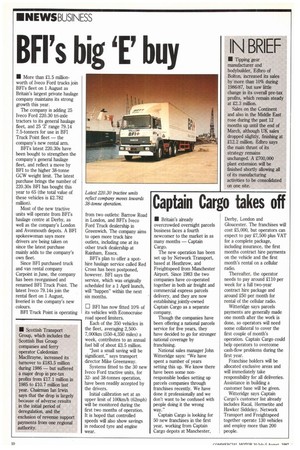BFI's big `E' buy
Page 12

If you've noticed an error in this article please click here to report it so we can fix it.
• More than £1.5 millionworth of Iveco Ford trucks join BFI's fleet on 1 August as Britain's largest private haulage company maintains its strong growth this year.
The company is adding 25 Iveco Ford 220.30 tri-axle tractors to its general haulage fleet, and 25 'Z' range 79.14 7.5-tonners for use in BFI Truck Point fleet — the company's new rental arm.
BFI's latest 220.30s have been bought to strengthen the company's general haulage fleet, and reflect a move by BFI to the higher 38-tonne GCW weight limit. The latest purchase brings the number of 220.30s BFI has bought this year to 65 (the total value of these vehicles is £2.782 million).
Most of the new tractive units will operate from BFI's haulage centre at Derby, as well as the company's London and Avonmouth depots. A BFI spokeswoman says more drivers are being taken on since the latest purchase mainly adds to the company's own fleet.
Since BFI purchased truck and van rental company Carpoint in June, the company has been reorganised and renamed BFI Truck Point The latest Iveco 79.14s join the rental fleet on 1 August, liveried in the company's new colours.
BFI Truck Point is operating from two outlets: Barrow Road in London, and BFI's Iveco Ford Truck dealership in Greenwich. The company aims to open more truck hire outlets, including one at its other truck dealership at Rainham, Essex.
BFI's plan to offer a spothire haulage service called Red Cross has been postponed, however. BFI says the service, which was originally scheduled for a 1 April launch, will "happen" within the next six months.
LI BFI has now fitted 10% of its vehicles with Econocruise road speed limiters.
Each of the 350 vehicles in the fleet, averaging 2,5007,000krn (550-4,350 miles) a week, contributes to an annual fuel bill of about £3.5 million.
"Just a small saving will be significant," says transport director Mike Greenaway.
Systems fitted to the 30 new Iveco Ford tractive units, for 32and 38-tonnes operation, have been readily accepted by the drivers.
Initial calibration set at an upper limit of 100Ian/h (62mph) will be monitored during the first two months of operation. It is hoped that controlled speeds will also show savings in reduced tyre and engine wear.




















































































































